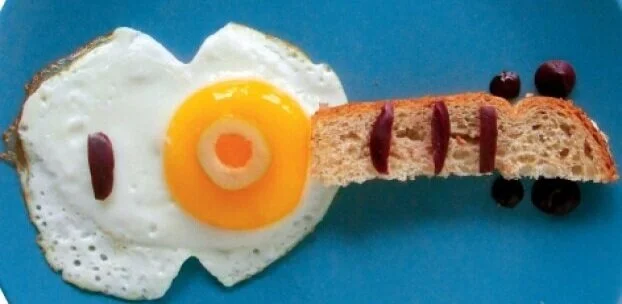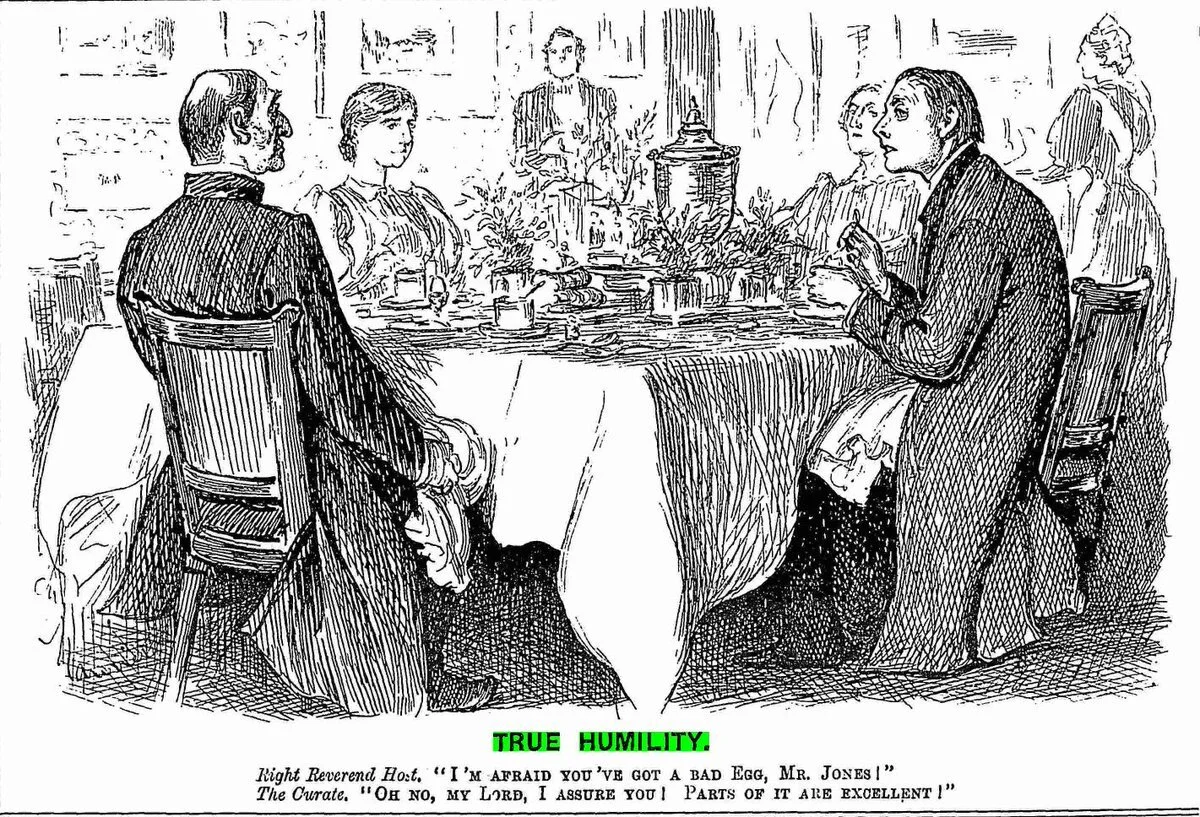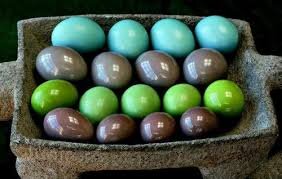By The Landlord
“A box without hinges, key, or lid,
Yet golden treasure inside is hid.” ― J.R.R. Tolkien, The Hobbit, or There and Back Again
“Do you see this egg? With this you can topple every theological theory, every church or temple in the world.” ― Denis Diderot
"The present was an egg laid by the past that had the future inside its shell.” – Zora Neale Hurston
“A hen is only an egg's way of making another egg.” – Samuel Butler
“A true friend is someone who thinks that you are a good egg even though he knows that you are slightly cracked.” – Bernard Meltzer
It's a perfect miracle of an organic machine, a breathable, porous, but waterproof often decorated vessel of creation, protection and delivery of life, whether in bird, or fish, or reptile, but also in early stages, human or other mammals. It’s the shape of existence, of our history, and of the larger universe. And eggs are such beautiful objects, not merely pleasing in feel and texture, but also in the sound of the word across many languages – whether egg or oeuf, Ei, huevo, 卵 (Tamago), ovo, 蛋 (Dàn), or яйцо (yaytso) (yeet-so), rich in vitamins and in idioms. And as food, a source of great particularity by people in preparation, so, however you like them, it is no wonder that the egg is ideal as literal or metaphorical material for the detail or larger context of a story or phrase in song.
And as well as Latin ovum, there are a number of rather lovely, strange-shaped obscure egg-related words. Ootocous is the adjective for egg-producing, with the noun oogenesis, oology is the study of eggs, an oometer is an instrument for measuring them, ooidal is another word for oval-shaped, and oomancy is the divination or worship of the humble egg. Oo-er indeed.
As sure as eggs is eggs, goes the saying, meaning something is definite, certain, habitual, and it is what it is, but the humble egg is really where the mundane meets the miraculous, this organic vessel containing the zygote in which an embryo develops until it can survive on its own, before the bird, or animal hatches. The slow struggle, the final arrival sums up everything we’ve come from, and will continue to be in an endless cycle. As Hermann Hesse put it: “The bird fights its way out of the egg. The egg is the world. Whoever will be born must destroy a world.”
How then does a chick of any species leave its house? Through the the eggs-it. And for the unfertilised form of egg, why do so many people like a boiled one for breakfast? Because it’s hard to beat. That’s all the yolks for now. Sorry, I had to get that out of my scrambled head.
Yet idiomatically, it’s odd why eggs are such rich source of lyrics for this topic, and why eggs cover so many contexts, and why a person can be a good egg, but also a bad egg, why you can’t make an omelette without breaking some eggs, and so many other sayings, including why a curate’s egg means something partly good and partly bad, taken from this portrayal of the clergyman seeing the positive side of a rotten one, from a George du Maurier cartoon, originally published in Punch magazine on 9 November 1895.
Eggs sit, or indeed roll across everything that’s both good and bad, just like many kinds of art:
Hmm. ‘Challenging’.
It’s also surprising, perhaps that eggs in themselves haven’t come up as a topic before. We’ve had Easter egg songs, ie hidden album tracks, chicken-and-egg songs relating to paradox and the like, and songs about curves and spheres, which of course included eggs, but only in passing and not at all about the many forms in which they are eaten.
Perhaps what’s most striking about eggs are their variety of colours and markings, now thought to be an integral part of the development of the shell, protein deposits also adding calcium carbonate markings. Why the mottled patterns? In some species these could be random, but n species such as the common guillemot, which nest in large groups, each female's eggs have very different markings, making it easier for females to identify their own eggs on the crowded cliff ledges on which they breed.
Guillemot eggs roll together on cliff edges
In texture they are also very varied. Cormorant eggs are rough and chalky, tinamou eggs are shiny and smooth, duck eggs are oily and waterproof, cassowary eggs, for example are heavily pitted. And tiny pores in all bird eggshells allow the embryo to breathe, with the average domestic hen's egg having around 7000 pores.
Vibrantly coloured tinamou eggs are naturally shiny
And why the shape? The oval is there for a purpose. cliff-nesting birds often have highly conical eggs so they can roll together in tight nest circle, and therefore are less likely to roll off. Hole-nesting birds meanwhile might have nearly spherical eggs.
The biggest land eggs are those of the ostrich, but of underwater fish species, the whale shark produces a whopper, although they are no actually laid, but stay inside the mother’s body. The saltwater crocodile lays sizeable eggs, but the biggest in proportion to its own size is the kiwi - an amazing 30% of its own size. Ouch. Perhaps it’s easier being a hummingbird, whose eggs can be as tiny as 0.2mm long.
Egg selection
Perhaps what is most potent about eggs is how humans respond to them, obsessively in all kinds of ways, whether with delight, or disgust, covetousness, or caring. “The vulgar boil, the learned roast, an egg,” said Alexander Pope. Many are very fussy about how to eat one in any form, boiled, poached, scrambled or otherwise, and this is brought into extreme satirical shape in Jonathan Swift’s Gulliver’s Travels, in which the islands of Lilliput and Blefuscu go to war over the issue of which end of an egg should be eaten out of, the "Little-Endians" and “Big-Endians" parodying sectarian divisions of all kinds.
Eggs are very important, especially to some. “Have you ever seen a man, woman, or child who wasn’t eating an egg or just going to eat an egg or just coming away from eating an egg? I tell you, the good old egg is the foundation of daily life. Stop the first man you meet in the street and ask him which he’d sooner lose, his egg or his wife, and see what he says!” Says P.G. Wodehouse, in Love Among the Chickens.
Eggs cross the world when it comes to cuisine. The oyakodon (親子丼) is a Japanese dish that means "parent-and-child donburi”, a rice bowl dish, in which chicken, egg, sliced scallion (or sometimes regular onions) and more are simmered form of soup with soy sauce and stock. It’s also the inspiration for Paul Simon’s song Mother and Child Reunion.
But on another musical note, the egg-shaped clay flute, the xun - is one of the oldest Chinese instruments and produces a beautiful, delicate, eerie sound.
Eggs can also be rather poetic in other ways. “When the sun touched the earth, it spread out along the horizon like a giant yolk oozing free of its skin, writes Christopher Paolini in Inheritance.
“The sky broke like an egg into full sunset and the water caught fire,” comes back the novelist and critic Pamela Hansford Johnson.
“Words are like eggs dropped from great heights; you can no more call them back than ignore the mess they leave when they fall,” writes Jodi Picoult.
But the fashion pioneer Coco Chanel reckoned you should regard people as so fragile. “Gentleness doesn't get work done unless you happen to be a hen laying eggs.”
“My fantasy breakfast is just a really good egg scrambled,” says the rock climber Alex Honnold, who famously scaled El Capitan, in Yosemite National Park without a rope, as captured in the film Free Solo. The connection that comes to mind here is another obsession with eggs, the tangata manu, the traditional Easter Island race to collect the first egg of the sooty tern, in which men would risk, and often lose their lives in a crazy attempt to prove manhood by swimming out to sea and risking death on the sheer cliff faces all for this precious, fragile prize. In a rather overblown Hollywood way, this is captured in the film Rapa Nui:
But at the very different end of what one might define as masculinity, does anyone recall this quintessentially British contest of ingenuity to invent delicate, self-propelling, frictionless machines to carry eggs across a winning distance, in 1979’s The Great Egg Race? Wonderful team work.
But eggs have also been the source of a very different obsession, in this egg-cellent documentary about compulsive egg collectors, Poached, in which ‘egging’ becomes a criminal source of theft prized above bird welfare:
Then at another eggs-tremity, eggs are just eggs when it comes to the famous egg-eating scene in Cool Hand Luke.
How do you follow all of that? With a little bit of egg-centricity, and a new song by Devandra Banhart, Vast Ovoid, which likely has little to do with eggs per se, but hopefully will set off this particular egg race with far better songs.
So then, I’m delighted to welcome this week’s no doubt egg-static and egg-cited guru back the the Song Bar chair, our Japanese correspondent, the wonderful Hoshino Sakura! Please place your song egg-samples in comments below in time for deadline on Monday 11pm UK time, for playlists published on Wednesday. The results, no doubt, will be most egg-cellently tasty.
Egg things on with more musical treasures below
New to comment? It is quick and easy. You just need to login to Disqus once. All is explained in About/FAQs ...
Fancy a turn behind the pumps at The Song Bar? Care to choose a playlist from songs nominated and write something about it? Then feel free to contact The Song Bar here, or try the usual email address. Also please follow us social media: Song Bar Twitter, Song Bar Facebook. Song Bar YouTube. Subscribe, follow and share.
Please make any donation to help keep Song Bar running:







